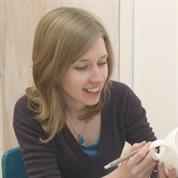Last night I attended Matthew Taylor’s annual lecture about deliberative democracy. I’m becoming a passionate advocate of this idea and how important it is for our future.
Matthew talked about why our democracy and the people in political power need this change. I’d like to highlight another place where our society needs this change.
Much has been discussed about people feeling disengaged, disenchanted and disenfranchised in recent years. Is deliberative democracy a way to give people back their voice, in a positive way? As Mathew Taylor has said, during citizens’ juries ‘ordinary people from all walks of life can be thoughtful, constructive and opened-minded.’ These opportunities must be positive for the participants involved.
I’d like to tell you my story. I’ve been a Fellow of the RSA since I was 21 after winning a Student Design Award. Over the last 12 years I’ve watched from the sidelines, not sure where I fitted in, but keen to support the RSA’s work on creating a better society. Earlier this year I was invited to an event for International Women’s Day. The Labour party had invited a selection of Derbyshire business women to celebrate our successes and discuss the challenges we face. Jeremy Corbyn attended. For me it was like a switch turned on. Someone was going to listen to me. My comments could be taken back to the places of power. Previously I’d had thought they would hear nothing more from me than my one vote on the infrequent opportunities I was asked for it.
I became informed. I went straight to the RSA, to delve deeper into the research. I went to my local RSA meetup knowing what I wanted to say (and I said it!)
This is what deliberative democracy can do. Give people a voice. It gives motivation to engage in our society.
I followed this first step with another, and another and now I am involved in organising an RSA event in Nottingham in October where we intend to spread this feeling of giving people a voice.
Step by step I have moved forward and each time I’ve been able to speak up, each time I’ve been listened to and each time I’ve become more informed. This is the opportunity that we should offer to everyone. Citizens’ Juries as part of deliberative democracy can do this.
We’d like to hear from any RSA Fellows interested in assisting with our Nottingham event. It will be an inclusive, family-friendly afternoon of participatory activities to fuel our desire to bring about change. Do get in touch with me at clare@claregage.com if you’re willing to help.
Related articles
-
Rachel Drapper: Featured Fellow Q&A
Rachel Drapper
Rachel Drapper, CEO and founder of Fairshare, discusses domestic labour inequity, gender roles and the way forward for those in our community who are striving for equity inside and outside the home.
-
RSA Fellows making an impact in the LGBTQ+ community
Maeve Devers Kirby Fullerton
Learn about just a handful of RSA Fellows doing innovative work to bring about social change in the LGBTQ+ community.
-
Comment at the RSA: coming full Circle
Mike Thatcher
The RSA has launched a Comment 'space' on its Circle community platform as it moves to a Circle-first approach for comment articles authored by Fellows.




Join the discussion
Comments
Please login to post a comment or reply
Don't have an account? Click here to register.
In my "wise democracy" research, I explore the relationships between power (in its many forms), participation (likewise), and wisdom (the broad benefit of policies and actions over time). I've identified 96 interrelated design guidances ("patterns") for helping to generate participatory collective wisdom and power, and curated hundreds of methods and materials to help people apply those design guidances. (It's an open source work-in-progress, ,so you are invited into the co-creation!) Most of these apply at all scales and sectors and might be helpful in your local deliberative initiatives. If you'd like to explore them, check out https://www.wd-pl.com/pattern-list-v2/ and click any of the links that interest you. I'd be interested in your comments, and am open to conversation about it all.
Great to meet you & looking forward to some collective change enabling in Chesterfield.
For me, the key to this discussion is empowerment - changing the balance of perceived & actual power in communities to enable real community organising. That involves listening to people in an active way so that their opinions & perspectives are valued and then helping them get together to create change. It's a facilitiation exercise that is rooted in valuing the contribution of us all & leading by serving/enabling.
Work in this area from Community Organising, Cormac Russell's Community Builders, LAC Networks etc has been very effective but we need to lose the labels/terminology that divide those programmes & focus on the horizon - what we are doing to empower ordinary people to do extraordinary things.
I've never understood why we expect people to be able to get behind decisions and strategies they've not even had the option of being involved in! As a facilitator, I'm very interested in the mechanisms used to make this happen and would love to hear any new ideas folk have.....?
I currently use ICA methods of Consensus Workshops and Group Strategic Planning methods and really love them. They work brilliantly to get people right to the heart of a decision and make sure that everyone gets heard, regardless of group dynamics.
I'm currently reading 'The Art of Gathering' by Priya Parker (and highly recommend it). She's just given an example of a place in New York where they completely re-designed court proceedings. From what I've read it sounds like they take group responsibility for the problem that has been caused and have a 360 degree look at the defendants life to see how they can solve the problem that led to the crime. Fascinating......
Citizens' juries are a valuable and very influential way of shaping political debate as a number of recent citizens' juries have demonstrated(Ireland, Melbourne, Geelong) but are only one of a number of deliberative democracy tools. They need to be complemented by other deliberative democracy tools, especially ones which help build inclusive communities and develop capability at a very local level. One good example which is starting to catch on is participatory democracy, a process through which communities determine how public money committed to their area should best be spent. In a really interesting example of how this could be used to create inclusivity, the Mayor of New York recently decided that all of the city's public schools should adopt participatory budgeting to determine how school budgets should be allocated - with all the school community including pupils involved. Another useful practice being pioneered in England at the moment is Civic crowdfunding . It is developing as a partnership between Spacehive.com an NGO committed to crowd funding for community projects and interested local authorities. The current best example is Crowdfund London.
Within the RSA let's use our influence to celebrate and support the diversity of deliberative democracy instruments.
I'm not in Nottingham but would be interested in how this develops. Ultimately I'd like the Lords to become a jury system, along the lines of jury service.